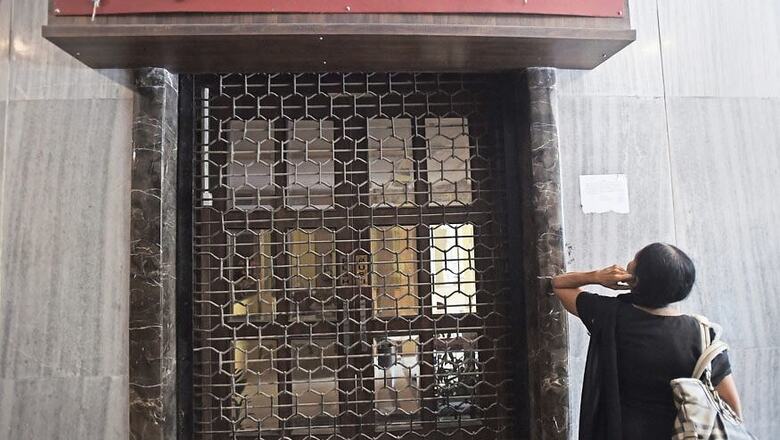
views
New Delhi: Bank frauds, which have been tumbling out of the cupboard almost at the rate of one a day recently, have lead to persistent calls for privatisation of public sector banks (PSBs).
Business chambers, CII and FICCI, have suggested that the government should bring down its stake in PSBs so that they can function efficiently. The chambers have also suggested that the total number of such banks be reduced, by merging some, to create less number of such banks but stronger banks. The government’s own chief economic advisor Arvind Subramanian has earlier called for greater private sector participation in PSBs.
We currently have 21 PSBs, against 13 ‘old’ private sector banks and 7 ‘new’ private sector banks, according to data available with the Department of Financial Services.
Not just the business chambers, other stakeholders also seem to suggest that the problem lies in government control of these behemoths, which lack proper regulatory oversight and become hubs for rampant siphoning off of lakhs of crores of taxpayers’ money.
So, when corporates take large loans and begin to default on repayments, it is the government, and by extension, you and me, who ultimately foot the bill since the state is the majority owner in PSBs. Whether privatization is the panacea to cure all that ails public sector banking in India, is a question worth pondering.
CII has said the first step should be for the government to reduce its stake to 52% and then devise a roadmap to bring down its stake in PSU banks to 33% in three to four years. And a Business Standard piece this morning speaks of revival of an earlier idea – a bank holding company – which will house all the shares the government owns in PSBs. Such a holding company could be managed by competent individuals, and decide when to lessen government holding in various PSBs and how much money to infuse in such banks.
Whether this is a first step towards eventual (even if long term) privatisation of PSBs is any body’s guess. But the idea has gained currency at just the right time, as the government readies for an improved showing in Rajya Sabha to be able to push this initiative, amid growing clamour for wide ranging banking reforms.
Why does private banking inspire more confidence in banking sector analysts than PSBs? Public sector banks are being funded by the government through tax payers’ money. This straight away means when large scams or frauds get unearthed, the taxpayers feel cheated. The Nirav Modi case, where there has been alleged siphoning off of over Rs 11,000 crore, is neither the first nor perhaps the last in a series of such cases where corporate loans turn bad and the defaulter flees India, never to return. PSBs then become punching bags of the ‘aam aadmi’, who feels betrayed.
A piece in the New Indian Express quotes government data to say that public sector banks restructured loans worth Rs 6,09,661 crore in last three years (2014-15, 2015-16 and 2016-17) meant for the industry sector alone (excluding agri lending). So if government were to reduce its stake in PSBs progressively, this automatically means its liability in cases of fraud or default in repayments comes down and by extension, protects the tax payer from sustaining further losses.
Or does it? The reason for persistent calls for privatization is also the perception that private banks (private enterprise wherever and in which ever sector) is better managed and therefore less likely to look the other way when large scale bad loans are burdening the banks’ books. This, however, has not been conclusively proved anywhere in the world.
The global financial crisis in 2008 showed how private banks can very well become targets of deep financial frauds. Even then, following the financial crises, the US government had to step in to hand bail outs to banks that were too ‘big to fail’. Effectively, for a time they became nationalized and so did their losses. Then what is the sense in seeking greater private sector participation while merging smaller banks to create larger entities, if government will eventually have to again prop them up in times of crises? Anyway, given PSBs’ role in serving farmers or MSMEs sometimes even in remote areas, privatization seems like a half baked idea to tackle the current mess.
Besides, even in India, the record of private banks is far from blemishes. According to a written reply in Lok Sabha last month, while PSBs reported 8,622 cases of fraud between 2014-15 and 2016-17, private sector banks reported 4256 cases of fraud during the same period. So, while PSBs were dealing with frauds at roughly twice the rate at private banks, the latter were also significantly troubled with fraud cases.
The CEA Arvind Subramanian has been advocating greater private sector role in PSBs but not in all such banks. In this piece from the Hindu Business Line, Subramanian has said that “The question is, are we getting enough value for this taxpayer money and will this taxpayer money be better protected in the current government ownership structure or will it require a different policy structure. The government also realises that some banks are unviable and need to be shrunk. There are three strong cases which have emerged for private participation in public sector banks. I am not saying all public sector banks should be privatized.”
All this brings us to the unavoidable truth: banking sector reforms are the need of the hour and a receding government role in running some PSBs is only part of the solution.
(The author is senior journalist. Views are personal)




















Comments
0 comment